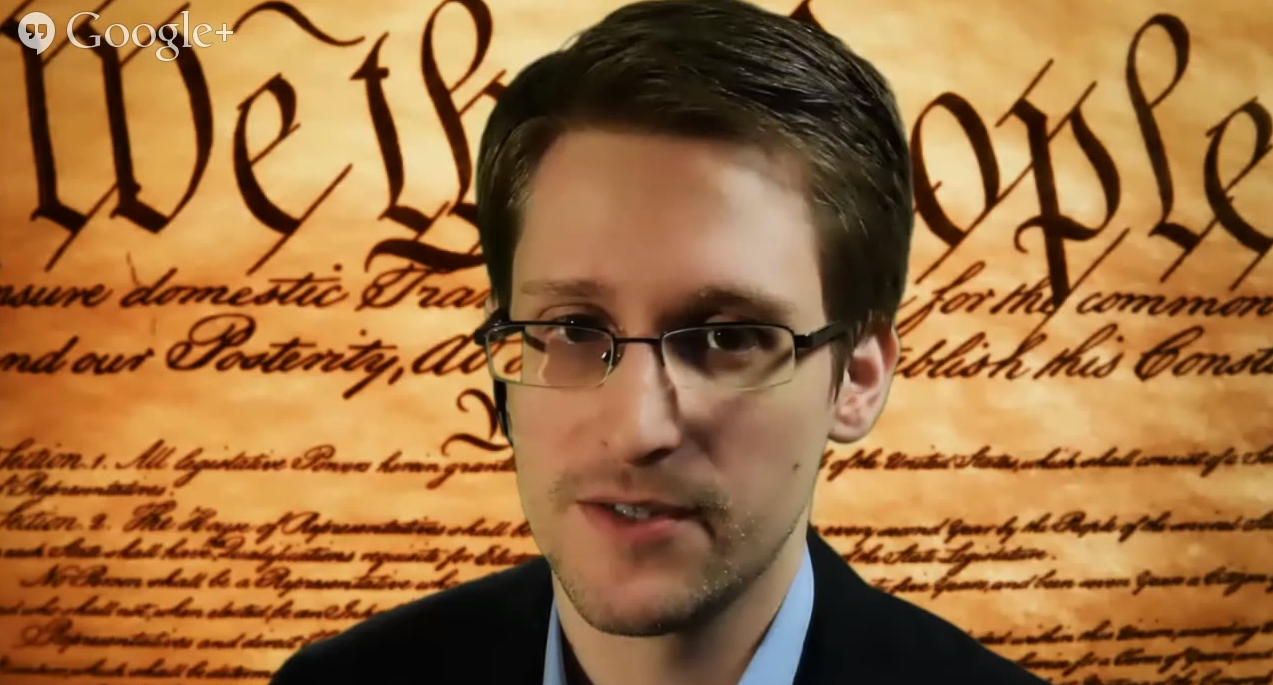
It has been almost a year since former intelligence contractor Edward Snowden turned over thousands of classified NSA documents detailing America's massive online spy operations to a journalist. Snowden, who was silent for most of the last year, has been on something of a media blitz since January, when the White House announced it would make only minor reforms to U.S. surveillance policies. In his latest interview, at the technology festival South by Southwest in Austin, TX, he focused on tech workers' responsibility in the fight for privacy in the digital age.
"South by Southwest and tech community" he said, "they're the folks who can really fix things, who can enforce our rights through technical standards."
Snowden teamed up with American Civil Liberties Union Technologist Christopher Soghoian for the interview. He joined the festival in Texas via livestream from Russia, where he is living in hiding under temporary asylum. "The irony that we are using Google Hangouts to talk to Edward Snowden has not been lost on me," said Soghoian, referring to the fact that one of Snowden's most infamous disclosures was about the NSA's PRISM program, which revealed how the the U.S. government uses secret court warrants to obtain private user data from Silicon Valley companies.
Since PRISM was first disclosed back in early June, said Soghoian, ad-driven Silicon Valley tech companies have made great strides in protecting user information. He cited Yahoo's adoption of SSL, an encryption that protects information as it passes between company servers and personal computers. This effectively limits major telecom companies from intercepting and viewing Internet data passing over their infrastructure, which is no small accomplishment considering that other Snowden leaks revealed how the NSA colludes with these companies to capture such information.
However, Soghoian added, this doesn't protect user data from Silicon Valley. This "truly end to end" encryption, as he put it, conflicts with their business model as ad-revenue based companies that sell customer information. "They want to be in that connection with you."
The pair said Internet users need to stop relying on free services for their private communications. "Encryption does work," Snowden said, encouraging everyday people not to view it as an "arcane black art." He pointed to the fact that U.S. investigators "still have no idea" what files he took (an assertion contradicted by an interview NSA director Michael Hayden gave last year). Specifically he advocated for "full disk encryption" (which protects the data stored on personal computers) and "network encryption" (which protects data as it passes from computer to computer.)
Snowden added that developers in the tech world need to start making these security measures more user-friendly. "If you have to go three menus deep," he said, "people aren't gonna use it." Case in point: when Snowden originally attempted to leak his NSA files--which detailed how the NSA spied on the emails, chats, call logs, videos and movements of millions of people around the world--journalist Glenn Greenwald didn't have the proper encryption standards set up to receive the information.
In a question put to Snowden toward the end of the talk, a Twitter user asked what the difference was between trusting a company with one's security and trusting the U.S. government. "My thinking," he said," is that "the government has the ability to deprive you of rights." He added that governments "can literally kill you." Presumably, this is a reference to a series of anonymous media interviews in which intelligence officials told Buzzfeed they would "love to put a bullet in his head."
For the final question, Ben Wizner, the director of the ACLU's Speech, Privacy and Technology Project, asked Snowden if he would leak the NSA files again, given the consequences. Snowden's answer was characteristically philosophical: "I took an oath to support and defend the Constitution," he said, speaking in front of a fuzzy blow-up that document, streaming live via Google.
Uncommon Knowledge
Newsweek is committed to challenging conventional wisdom and finding connections in the search for common ground.
Newsweek is committed to challenging conventional wisdom and finding connections in the search for common ground.





